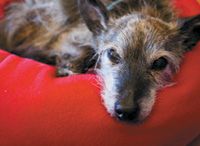Penn research development: Experimental vaccine for non-Hodgkin's lymphoma
The vaccine shows an increase in survival time for dogs with spontaneous non-Hodgkin's lymphoma.
PHILADELPHIA — A first-of-its kind experimental cancer vaccine that shows an increase in survival time for dogs with spontaneous non-Hodgkin's lymphoma (NHL) has been developed by researchers at the University of Pennsylvania's veterinary and medical schools.

The study involved dogs brought to Penn's Matthew J. Ryan Veterinary Hospital with newly diagnosed NHL that had reached clinical remission following induction chemotherapy. Nineteen of the dogs were given a vaccination of autologous CD40-activated B cells (every other week resulting in three intradermal injections in the flank) that were loaded with RNA previously isolated from autologous lymphoma cells. Another 64 dogs were selected from a group of 130 to remain unvaccinated in a control group.
The experimental vaccine was produced by culturing B cells from the blood taken from dogs with NHL. The cells were loaded with RNA isolated from the patients' own tumors.
Previous cell-based vaccines have used genetically engineered dendritic cells—which are part of the immune system—to stimulate immune responses against cancers. In fact, the U.S. Food and Drug Administration (FDA) recently approved such a vaccine—sipuleucel-T—for the treatment of advanced prostate cancer. In dendritic cell vaccines, the cells are loaded with tumor proteins and injected back into the patient's body. But the process is costly and time-consuming, according to the study. The research team determined that another type of immune cell, B cells, may also work in the process.
The research team hypothesized that B cells—which can be grown from a small blood sample, removing the requirement for patients to go through the lengthy process required to separate the dendritic cells from blood—could work just as well as dendritic cells, under the right conditions.
"Though vaccinated and unvaccinated dogs relapsed with clinical disease at the same time, 40 percent of vaccinated dogs that relapsed experienced long-term survival after a second round of chemotherapy; only 7 percent of unvaccinated dogs that relapsed and were treated with the same rescue chemotherapy protocol survived long term," says lead author Nicola Mason, PhD, assistant professor of medicine at Penn Vet. "Furthermore, when the vaccinated long-term survivors did eventually die, they showed no evidence of lymphoma on full necropsy."
Mason says she believes that the vaccine-primed immune system may be boosted by the effects of rescue chemotherapy leading to long-term second remissions.
"We found that although the vaccinated dogs still relapsed with clinical disease when they were treated with rescue chemotherapy, they had significantly increased overall survival times when compared to an unvaccinated control group. Some of these dogs are still alive and cancer-free more than three years later," Mason says. "The results with these dogs indicate that our immunotherapy and rescue chemotherapy appear to act synergistically to prevent a second relapse—a phenomenon that has been previously recognized in human patients treated with other types of immunotherapy."
The concept for B cell-based cancer vaccines is already a step forward in cell-based vaccine development, but the study indicates that future research could take the concept a step further.
"These dogs just received three doses of vaccine, three weeks apart. If we kept boosting the immune system in this way by vaccination, perhaps the dogs would not relapse in the first place," Mason says.
Work is now underway to streamline B cell vaccine generation and initiate further clinical trials aimed at optimizing this novel cell-based approach, according to Penn.
Led by Mason; Karin U. Sorenmo, DVM, associate professor of oncology at Penn Vet; and Robert H. Vonderheide, associate professor of hematology and oncology at the Perelman School of Medicine, the study was published in the online journal, PLoS One. Erika Krick, Beth Overley and Thomas P. Gregor of Penn Vet and Christina M. Coughlin of the School of Medicine also contributed to the research. The study was funded by the National Institutes of Health, Alliance for Cancer Gene Therapy, Onyx and Breezy Foundation, Barry and Savannah Poodle Memorial Fund, Mari Lowe Comparative Oncology Center, Immunobiology Program of the Abramson Cancer Center at the University of Pennsylvania and Oncology Research Fund at the Veterinary Hospital of the University of Pennsylvania.







